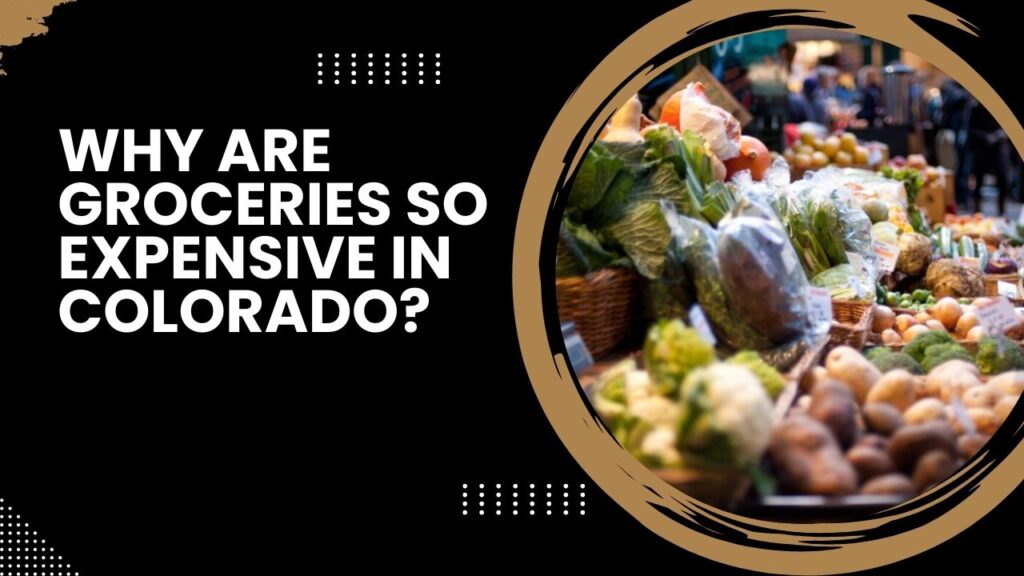Why Are Groceries So Expensive In Colorado? Grocery prices in Colorado are high due to elevated production costs, supply chain disruptions, and labor shortages.
As grocery prices continue to climb across the United States, Colorado residents have particularly felt the strain on their wallets.
Whether it’s the higher price tags on essentials like milk, fresh produce, or canned goods, the cost of groceries in Colorado is raising questions.
Factors like production costs, supply chain issues, and unique local conditions contribute to this trend. Understanding these dynamics can offer insight into why grocery costs are high and what, if anything, might alleviate them in the future.
This article will explore both the broader context of grocery pricing in the U.S. and the specific reasons Colorado has seen a noticeable impact.
While some issues are common nationwide, others are more unique to the region, driven by its geography, demographics, and lifestyle.
What Contributes to Grocery Prices?
Nationally, grocery prices are influenced by a range of economic factors that have only become more complex in recent years. [Why Are Groceries So Expensive In Colorado?]
Production costs, labor, supply chain logistics, and retail practices all play a role in determining the price of goods on the shelves.
Let’s take a closer look at each of these factors to understand the baseline for grocery prices before exploring Colorado-specific challenges.
Production Costs
The cost to produce food includes expenses related to farming, such as fuel, equipment, fertilizer, seeds, and even water. [Why Are Groceries So Expensive In Colorado?]
Recently, rising costs for essential materials like fertilizer have increased the price to grow food, impacting everything from grains and vegetables to livestock feed.
Additionally, extreme weather conditions and natural disasters affecting major farming areas have caused price spikes for products like wheat, corn, and dairy.
Supply Chain Logistics
Once food is produced, it must be transported to stores. The journey from farm to store can include multiple steps, like processing and packaging, each requiring resources.
Transportation costs have spiked due to rising fuel prices, leading to higher grocery prices across the country. [Why Are Groceries So Expensive In Colorado?]
Labor shortages in the transportation industry have further complicated the supply chain, often causing delays that disrupt availability and drive up prices.
Labor Costs
Labor shortages are not only a national issue but one that affects multiple industries within the food supply chain. [Why Are Groceries So Expensive In Colorado?]
From farm labor to trucking, and even retail, every step of the process has been impacted by a lack of available workers.
With fewer workers available, companies often increase wages to attract and retain employees, which translates into higher costs passed on to consumers at the grocery store.
Retail Markups and Consumer Demand
Finally, once groceries reach the shelves, retail pricing strategies come into play. Retailers set prices based on supply, demand, and overhead costs.
High demand for certain items, or increased overhead costs such as rent and utilities, can lead to steeper prices for consumers. [Why Are Groceries So Expensive In Colorado?]
During the COVID-19 pandemic, demand for essentials surged, leading to ongoing elevated prices in certain product categories.
Why Are Groceries So Expensive in Colorado?
While all states have been affected by national economic pressures, Colorado faces unique challenges that have exacerbated these issues.
Below are the primary factors that contribute to Colorado’s high grocery costs.
1. Geographical Challenges
Colorado’s diverse and mountainous terrain poses unique challenges for transporting goods. [Why Are Groceries So Expensive In Colorado?]
Much of Colorado’s rural areas are remote and can only be accessed by driving through mountainous roads.
Transportation companies face increased fuel costs and extended travel times, especially during the winter months when roads can become hazardous. The added expenses are typically reflected in the price of goods.
Furthermore, Colorado’s high elevation affects logistics as well, with thinner air impacting fuel efficiency, meaning trucks often require more fuel to transport goods into and across the state.
2. High Cost of Living
Colorado has experienced a rapid increase in the cost of living over the last decade, with housing, utilities, and other basic expenses rising substantially.
As the cost of living increases, so does the cost of doing business in the state. Higher expenses for retailers often mean higher prices for consumers, and grocery stores are no exception. [Why Are Groceries So Expensive In Colorado?]
In areas like Denver and Boulder, where housing and rent are among the highest in the state, grocery prices also tend to reflect these elevated costs.
3. Labor Shortages
Labor shortages in Colorado have been a persistent issue, impacting industries across the board.
The agriculture and retail sectors, both essential to the grocery supply chain, have been hit especially hard. [Why Are Groceries So Expensive In Colorado?]
Many farms and grocery stores have struggled to find enough workers, which has led them to increase wages to attract employees.
This wage increase often trickles down to consumer prices, making groceries more expensive.
Additionally, Colorado’s proximity to other high-cost states means that competition for labor is fierce, further driving up wages.
4. Supply Chain Disruptions
Supply chain disruptions have affected the availability of goods in Colorado. [Why Are Groceries So Expensive In Colorado?]
The COVID-19 pandemic exposed vulnerabilities in global and national supply chains, causing delays and shortages that impacted everything from canned goods to fresh produce.
Colorado’s location and unique challenges with transportation exacerbate these issues.
Limited warehouse and storage capacity mean that disruptions impact Colorado’s grocery supply more noticeably, leading to price spikes on essentials when items are less readily available.
5. Local Market Dynamics
There is a growing demand in Colorado for organic, locally sourced, and specialty products, reflecting the state’s environmentally conscious and health-focused population.
Colorado consumers often prioritize fresh, high-quality ingredients, which can be more expensive. [Why Are Groceries So Expensive In Colorado?]
Locally sourced goods come at a premium, as smaller, independent producers may lack the economies of scale that larger, national suppliers benefit from.
This market dynamic contributes to higher grocery costs, as consumers are willing to pay more for products that align with their values and lifestyle.
How Colorado Compares to Other States
Interestingly, although grocery prices in Colorado are high, the state’s rate of grocery inflation has been somewhat lower than the national average.
Over the past year, Colorado’s grocery inflation rate has been around 2.9%, compared to higher rates in states like California and New York.
This difference can be attributed to Colorado’s proximity to agricultural regions in the Midwest, allowing the state to source certain products with less logistical expense than other states.
However, this advantage is often offset by Colorado’s internal challenges. [Why Are Groceries So Expensive In Colorado?]
Colorado is not alone in dealing with high grocery prices, but its unique combination of geographical constraints, labor market dynamics, and local consumer preferences creates a grocery market that is particularly sensitive to both local and national economic pressures.
Efforts to Mitigate Grocery Costs
Various efforts are underway to address the rising cost of groceries in Colorado. [Why Are Groceries So Expensive In Colorado?]
Both government initiatives and community-based programs aim to reduce costs and improve access to affordable, high-quality food.
1. Government Initiatives
The state of Colorado has launched programs aimed at supporting local farmers, reducing barriers to food production, and addressing food insecurity.
State agencies have invested in grants to help local farmers increase production efficiency, which could eventually lead to lower prices.
There are also initiatives to improve transportation infrastructure, reducing the impact of road closures and harsh weather on grocery distribution. [Why Are Groceries So Expensive In Colorado?]
2. Community Solutions
Farmers’ markets and food co-ops are thriving across Colorado, offering residents an alternative way to buy fresh produce and other essentials.
Co-ops operate on a membership basis, allowing members to access bulk pricing and support local growers directly. [Why Are Groceries So Expensive In Colorado?]
Many farmers’ markets also accept government food assistance programs like SNAP, making fresh food more accessible to lower-income families.
Furthermore, food banks and nonprofit organizations are working to address food insecurity by distributing groceries to those in need, helping alleviate the financial burden for many families.
3. Alternative Retail Models
New retail models, such as subscription-based grocery services and food-sharing programs, are emerging in Colorado. [Why Are Groceries So Expensive In Colorado?]
Subscription boxes focused on local and organic produce allow residents to purchase fresh produce directly from farmers, often at a lower price than retail stores.
Food-sharing programs encourage community members to share excess food, helping to reduce waste and provide low-cost or free options for those in need.
Final Verdict: Why Are Groceries So Expensive In Colorado?
Grocery prices in Colorado are the result of a complex mix of national economic pressures, local market dynamics, and geographic challenges. [Why Are Groceries So Expensive In Colorado?]
While the high cost of living, labor shortages, and demand for premium products are significant contributors, Colorado’s geography plays a particularly crucial role in driving up prices.
Although the state’s grocery inflation rate has been lower than the national average, prices remain high relative to other regions, placing a financial strain on many families.
Efforts by the state government, communities, and alternative retailers are slowly helping to provide relief, though the impact may be gradual.
In the meantime, understanding the root causes of grocery prices in Colorado can empower residents to make informed choices, whether that’s supporting local markets or joining co-ops to save on essentials.
See Also: Why Are Carry-ons More Expensive Than Checks?
FAQs
Why is the cost of living high in Colorado?
The high cost of living in Colorado is primarily driven by expensive housing, utilities, and transportation costs, which indirectly affect retail and grocery prices as well. [Why Are Groceries So Expensive In Colorado?]
Are groceries more expensive in urban or rural Colorado?
Generally, rural areas see higher grocery prices due to added transportation costs and limited store competition. Urban areas like Denver may also have high prices, but competition among stores can sometimes result in better deals.
How do local products impact grocery prices?
Colorado has a strong market for organic and locally sourced foods, which are often more expensive to produce and distribute, leading to higher grocery prices for consumers.
What are some tips for saving on groceries in Colorado?
Shopping at farmers’ markets, joining food co-ops, utilizing local discount grocers, and taking advantage of food assistance programs are all strategies to reduce grocery costs in Colorado.
Will grocery prices in Colorado stabilize soon?
While national and global economic improvements could bring some relief, Colorado’s unique challenges, including geographic barriers and high local demand for premium products, mean that high grocery prices may persist in the near term.

Hello, I’m Ashlyn Fleming from Sedona, Arizona. After finishing my Master’s, I noticed rising prices on everything I buy for my family. Curious about why, I started a blog to share my findings with friends and family.
